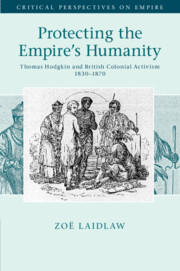‘Through the entwined histories of Thomas Hodgkin and the Aborigines' Protection Society, Zoë Laidlaw builds a set of new narratives about the tense and tender interdependence of imperial humanitarianism and indigenous sovereignty. Mapping a far-flung ecosystem of liberal reformers and their dynamic, often contradictory, social/political formations, this study materializes the network of transimperial mobilities that animated white settler ambition.'
Antoinette Burton - University of Illinois Urbana-Champaign
‘This is an insightful and extraordinarily informative account of imperial humanitarianism in mid nineteenth century Britain. Laidlaw shows with depth and complexity the struggles of Thomas Hodgkin and the Aborigines' Protection Society to articulate and encourage a form of colonialism respectful of indigenous people's rights at a time when Britain's settler colonies were rapidly and often brutally expanding into indigenous lands. Her study of this ultimately impossible project, exploring its failures and occasional successes, enhances enormously our understanding of the nature and consequences of Britain's colonial empire.'
Ann Curthoys - The University of Sydney
‘Between the 1820s and the 1860s the multitalented Quaker medic and philanthropist Thomas Hodgkin was a focal point for influential discussions of racial difference, free labour, free trade, the nature of civilisation, duty and science, and the relationship between humanitarianism and colonialism in the Caribbean, the British settler colonies, the USA and India. This magisterial account of Hodgkin, his interlocutors and the organisations to which he contributed, founded on decades of scrupulous research, will change the way we think about mid-Victorian Britain and its Empire.'
Alan Lester - University of Sussex
‘… magisterial in its scope … a major contribution to the examination and illumination of Victorian humanitarianism in the nineteenth century. It warrants close and attentive reading by scholars.’
Penny Edmonds
Source: History Australia
‘The book is a careful and important reminder to historians that ‘humanitarianism’ was (and is) neither unified nor self-evident in its politics, policies, or relationship to power. … [it is] deeply researched and shows, with close attention to personal networks and institutional politics, the ambiguity and historical specificity of the ‘rights’ framed and promoted by imperial humanitarianism.’
Padraic X. Scanlan
Source: Journal of Modern History



